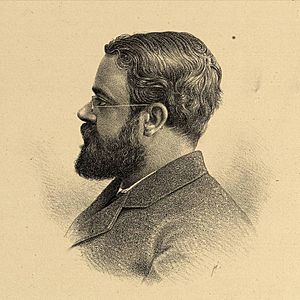Alfredo Chavero facts for kids
Quick facts for kids
Alfredo Chavero
|
|
|---|---|
 |
|
| President of the Chamber of Deputies | |
| In office 16 September 1890 – 30 September 1890 |
|
| Succeeded by | Francisco Mejía |
| Member of the Chamber of Deputies for San Luis Potosí′s 9th district |
|
| In office 16 September 1902 – 15 September 1904 |
|
| Member of the Chamber of Deputies for Zacatecas′s 9th district |
|
| In office 16 September 1888 – 15 September 1902 |
|
| Member of the Chamber of Deputies for the Federal District′s 2nd district |
|
| In office 16 September 1878 – 15 September 1880 |
|
| Personal details | |
| Born | 1841 |
| Died | 1906 |
Alfredo Chavero (1841–1906) was a talented Mexican man. He was an archaeologist (someone who studies old things), a politician, a poet, and a writer of plays (a dramatist).
Many people remember Chavero because he helped publish important old Mexican histories. He also edited many ancient picture documents.
Studying Ancient Mexico
Alfredo Chavero spent a lot of time studying ancient Mexican history. He wrote a book called Historia Antigua de Mexico. He also wrote many works about Aztec archaeology. This included studies on their old buildings and monuments.
While digging at the Great Pyramid of Cholula, he found some ancient statues. These statues are now in the National Museum of Mexico. People often look at his books for his research on Father Sahagún. They also use his work to understand the famous Sun Stone.
His Life in Politics
Chavero became a member of the Mexican Congress in 1869. He supported several Mexican presidents. These included Benito Juárez, Sebastián Lerdo de Tejada, Manuel González, and Porfirio Díaz. He worked with them even though they had different ideas.
In 1879, there was a big event in Veracruz. The government ordered the execution of nine citizens. They were thought to be planning against the government. This action caused a lot of anger among the public.
At that time, Chavero was a leader in a group called Freemasons. He took action against the general who carried out the order. He also temporarily stopped President Díaz's rights as a Freemason. These actions made Chavero very popular. He even gave a powerful speech in Congress against the general and Díaz. Later, Chavero and Díaz became friends again.
Chavero was elected as a senator in 1886. He also taught about mining and law in Mexico. In 1881, he became a member of the American Antiquarian Society. This is a group that studies American history and culture.
In 1897, the Mexican government wanted to pass a "Law of Monuments." This law would stop old Mexican artifacts from being sent out of the country. Chavero disagreed with this part of the law. He believed it would stop museums in other countries from getting artifacts. He thought this would hurt the study of science.
In 1902, Chavero spoke at a big meeting in New York. It was called the International Congress of Americanists. He gave credit to a French project for finding important things at Monte Albán. This was a famous ancient city. However, another Mexican expert, Leopoldo Batres, disagreed strongly. Batres had done his own digging at Monte Albán. He said the Mexican government had paid for that work.
In 1906, Chavero gave an important old book to the National Museum of Mexico. It was called the Chavero Codex of Huexotzingo.
His Creative Works
Alfredo Chavero was also a talented writer. He wrote many plays. Some of his famous dramas include “La Reina Xochitl,” “La tempestad de un beso,” and “Quetzalcoatl.” He also wrote “Los amores de Alarcón” and “La hermana de los Ávilas.”
See also
 In Spanish: Alfredo Chavero para niños
In Spanish: Alfredo Chavero para niños

